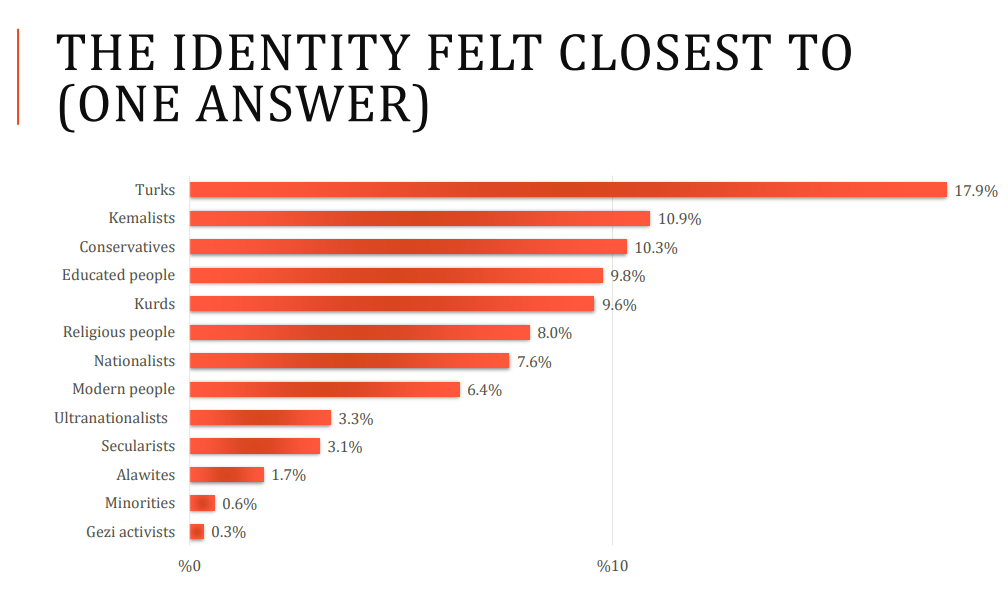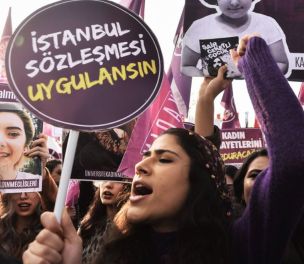Photo: AA/File
Click to read the article in Turkish
A new study aiming to reveal the extent of political polarization in Turkey has been published by the Strategies and Tools for Mitigating Polarization in Turkey Project (TurkuazLab).
Based on face-to-face interviews with 4,006 participants, the study concluded that the desire to coexist in the country is "low" as more than 70 percent of the people said they wouldn't want to be neighbors or do business with the supporters of the parties they felt most distant from.
Among respondents, 34 percent felt themselves close to the ruling Justice and Development Party, 11 percent to its ally Nationalist Movement Party (MHP), 22 percent to the main opposition Republican People's Party (CHP), 9 percent to its ally İYİ (Good) Party and 9 percent to the Peoples' Democratic Party (HDP). These figures are close to the recent opinion polls and the last election results.
CLICK - Full text of the study
When the political party supporters they feel most distant from, 40 percent of the participants pointed out the HDP, a party accused by the ruling alliance of being the "political extension" of the outlawed Kurdistan Workers' Party (PKK).
It was followed by the AKP with 23 percent, the CHP with 14 percent and the MHP with 8 percent.
The rate of those who felt the HDP was the most distant party to them was 55 percent in 2015 and 53 percent in 2017, notes the study. The rate of those who see the AKP as "others" also reduced by five percent.
Social distance, moral superiority and political intolerance
The study examines "emotional political polarization" in the country and the three elements of it, which it states as social distance, moral superiority and political intolerance.
Accordingly, a significant chunk of the respondents tend to feel that they are morally superior to those with opposing views and to prefer not to be in the same environment as them.
Here are the findings of the study in terms of "the three pillars of polarization":
- 75% of the respondents did not want their child to marry a supporter of the political party which they feel "the most distant to",
- 72% of the respondents did not want to do business with a supporter of the political party which they feel "the most distant to"
- 67% of the respondents did not want their children to play with the children of the political party supporters which they feel "the most distant to",
- 61% of the respondents did not want to be neighbors with the supporters of political parties which they feel "the most distant to".
- Supporters of political parties attributed the positive adjectives such as patriotic (87%), working to the benefit of the country (%86), honorable (85%), open-minded (84%), smart (83%) and generous (80%) to the supporters of their party,
- Whereas they described the "most distant to" party supporters as hypocrite (86%), selfish (85%), arrogant (82%), cruel (79%), threat to the country (78%) and bigoted (77%)
- 41% of the respondents objected the supporters of the political party which they felt "the most distant to" organizing a rally in their city,
- 37% of the respondents objected the supporters of the political party which they felt "the most distant to" making a press release,
- 37% of the respondents objected the supporters of the political party which they felt "the most distant to" being able to organize a meeting in their city,
- 35% of the respondents objected the supporters of the political party which they felt "the most distant to" being able to get education in accordance with their needs,
- 34% of the respondents objected to the supporters of the political party which they felt "the most distant to" becoming candidates for undertaking political roles.
Political preferences overlap with identities
The study demonstrates a correspondence between the identities that people affiliate themselves with and their political party preferences, which it says is "one of the most important reasons behind emotional political polarization."

Echo chambers and spiral of silence
"One of the most significant determinants of emotional political polarization is the formation of echo chambers, where individuals only get information from sources that reflect and reinforce their own
opinion rather than different channels," says the report.
On the other hand, it says, spirals of silence are formed when people who feel their opinions are in the minority choose to remain silent.
According to the survey, 70% of the respondents stated that they agreed with their close circles on political issues and 70% stated that their relations with their close circles did not deteriorate due to their political opinions.
Also, the supporters of the AKP said they watch the news on pro-government broadcasters such as ATV, A Haber and Kanal 7 and the opposition supporters said they watch channels critical of the government such as Halk TV and Fox. Both groups of people think that the broadcasters they watch are unbiased.
the Turkuazlab project was launched by the German Marshall Fund of the United States (GMF) in partnership with the Istanbul Bilgi University Center for Migration Research (BILGI-Migration) in March 2020. ıt is financially supported by the Swedish International Development Cooperation Agency (SIDA). (AÖ/VK)






kjh.jpg)

